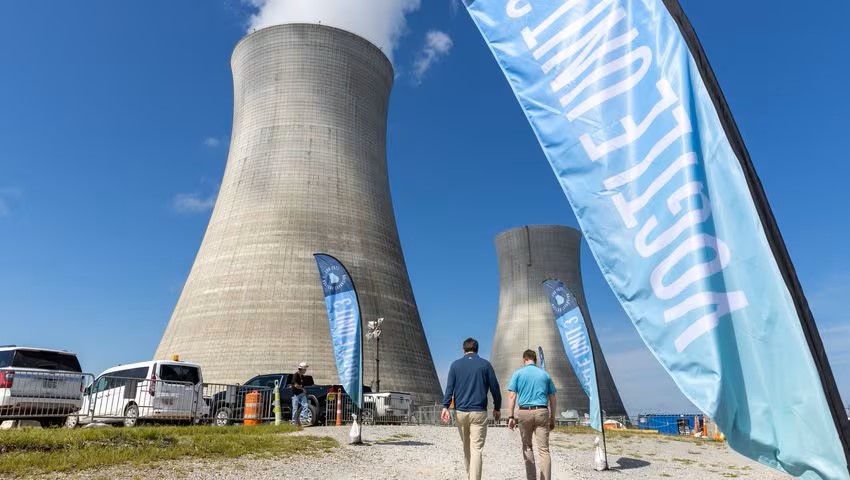By Drew Kann, The Atlanta Journal-Constitution —
Over a day and half of hearings this week, Georgia Power pushed state regulators at the Georgia Public Service Commission to approve a preliminary plan to roll most of the remaining costs of Plant Vogtle’s expansion into customers’ bills.
The proposal would allow Georgia Power to collect $7.56 billion in capital and construction costs incurred to build the two new reactors at the site near Augusta from ratepayers in the coming years. The company’s shareholders, meanwhile, would swallow the remaining $2.63 billion in construction spending on the project.
Factoring in some outstanding financing costs, the total tab the company wants its ratepayers to cover rises to $8.58 billion.
If the plan is approved, it will mean a cumulative rate increase of roughly 10% for most residential customers, Georgia Power’s executive vice president and chief financial officer Aaron Abramovitz testified on Tuesday, with exact amounts varying by the customers’ rate plan and energy usage. That includes a rate increase of about 3.2% that took effect after Vogtle’s first new reactor entered commercial operation this summer.
The units are the first two reactors built from scratch in the U.S. in more than three decades and will provide huge amounts of electricity, free of greenhouse gases.
The expansion of the plant near Augusta was supposed to cost $14 billion, but total spending by all partners involved in the project has now eclipsed $35 billion. The first new reactor, Unit 3, was completed more than seven years behind schedule. Then, this fall, a cooling component failure discovered at the yet-to-be-finished second reactor — known as Unit 4 — caused a fresh delay, pushing its completion to early next year, at least six years later than expected. By the time Unit 4 enters service, Georgia Power expects it will have spent $10.2 billion just to build the reactors.
The proposal to raise rates must still be approved by the five elected members of the PSC, who are set to decide whether to approve or tweak the plan on Dec. 19. But in this week’s hearings, the plan received little pushback from environmental groups, consumer watchdogs or the PSC’s public interest staff, who for years had been sharply critical of Georgia Power’s management of the project.
That’s because many of the parties involved — including the PSC’s public interest staff, the Georgia Association of Manufacturers, the environmental organization Georgia Interfaith Power and Light and the consumer advocacy group Georgia Watch — gave their stamp of approval to the $7.56 billion deal well before this week’s hearings even began. Though no formal agreement exists, it’s typical for parties to these settlements — known as a stipulation — not to cross-examine the other side’s witnesses.
In his testimony, Georgia Power’s Abramovitz defended the plan as a good deal for ratepayers that was backed by a diverse group of stakeholders.
“The company and all other stipulating parties recognize the stipulation as a fair and reasonable resolution of the outstanding issues in this proceeding,” Abramovitz said.
Over the years, the PSC’s public interest staff and their hired consultants have chronicled the issues they said led to Vogtle’s costly delays and hindered monitoring of the project: Low productivity, poor construction quality, unrealistic timelines and inaccurate cost estimates from Georgia Power.
Steven Roetger, the lead Vogtle analyst for the PSC’s public interest staff, who has monitored the project since its inception, said he believed there was ample evidence showing the company should not be allowed to recover all of its costs. Still, Roetger added that, “We reached a settlement with respect to that dollar amount (that should be disallowed) and we recommend that the stipulation be adopted in its entirety.”
Others sharply disagreed with the deal that was struck with the company.
Testifying on behalf of the consumer advocacy group Concerned Ratepayers of Georgia, Patty Durand, an energy consultant, blasted the agreement as a “backroom deal” that will harm Georgia Power customers for years. Durand is the potential Democratic candidate for the PSC’s District 2 seat currently held by the commission’s Republican Vice-chairman Tim Echols.
The hearings also featured discussion of what happens to the U.S. nuclear industry now that Vogtle is nearly complete.
Drew Stover, business manager for the International Brotherhood of Electrical Workers Local 84, a labor union that represents many electricians that worked on Vogtle’s expansion, praised Georgia Power and the commission for pursuing the project. Stover, however, lamented that his workers’ skills are not being transferred from Vogtle to the country’s next major nuclear project.
Vogtle Units 3 and 4 were built with the hope that they would usher in a nuclear renaissance. But even with the federal government backing an aggressive expansion of the country’s capacity as a key tool to limit climate change, that rebirth has not materialized. Vogtle’s ballooning costs are part of the reason why.
While some utilities have explored building new reactors, there are no other commercial nuclear plants under construction in the U.S., or any signed orders to build new ones. In another sign of the dim outlook for the industry, a project in the Western U.S. that was supposed to develop a set of six smaller nuclear reactors was recently cancelled, citing rising costs and a lack of interest from utilities.
Copyright © 2023 The Atlanta Journal-Constitution


